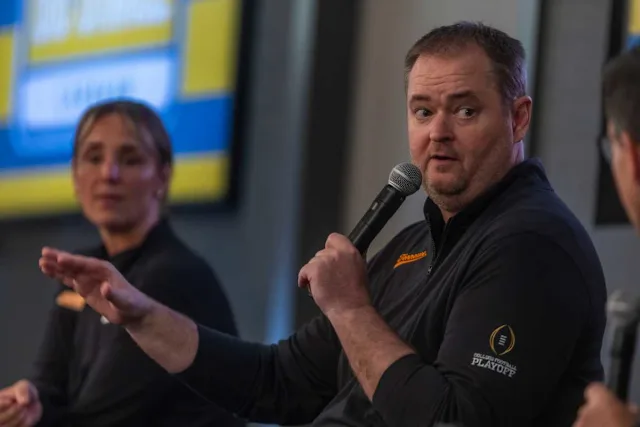Tennessee head coach Josh Heupel throws shade at former Vols QB Nico Iamaleava, fueling speculation over his departure.

The world of college football has always been filled with intrigue, drama, and surprise twists, and recently, the Tennessee Volunteers have found themselves at the center of a controversy involving one of their former quarterbacks, Nico Iamaleava. The 2023 five-star recruit, considered by many to be the future of Tennessee football, has now departed the program under circumstances that have left fans and pundits alike questioning the reasons behind his exit. Tennessee head coach Josh Heupel has recently weighed in on the situation, making comments that have fueled speculation about the real reasons for Iamaleava’s departure and what it means for the Vols’ future.
The Rise and Fall of Nico Iamaleava
Nico Iamaleava was once seen as the face of Tennessee’s future, a highly-touted quarterback with a skill set that could elevate the program to new heights. After committing to Tennessee in 2023, Iamaleava was expected to step in as a starter and be the leader for the Vols for the foreseeable future. His recruitment was a major coup for Heupel and the Tennessee program, as he was regarded as one of the top quarterbacks in the 2023 class and an elite talent at the position.
After spending much of his freshman season as a backup, Iamaleava had an opportunity to take over the starting role in the 2024 season. He played well, showcasing his arm strength, mobility, and poise under pressure. While his play showed promise, it became clear that something was amiss behind the scenes.
The relationship between Iamaleava and Tennessee’s coaching staff seemed to sour as the season progressed, and reports began to surface about tensions between the quarterback and the coaching staff. One of the major points of contention appeared to be Iamaleava’s Name, Image, and Likeness (NIL) deal, which became a focal point of his exit.
The Role of NIL and Discontent Behind Closed Doors
NIL has changed the landscape of college sports in profound ways. Players now have the ability to profit off their name, image, and likeness, something that was previously prohibited. While many players have used NIL deals as a way to supplement their college experience, others have viewed it as an opportunity to leverage their talent into lucrative opportunities. Iamaleava, who was already one of the most marketable players in college football, was no exception.
Reports indicate that Nico Iamaleava’s expectations for his NIL deal began to grow. Initially, he had signed a deal worth approximately $2 million, a substantial sum for any college player. However, as his profile continued to rise, it seems that Iamaleava became increasingly dissatisfied with the terms of his contract. Sources close to the situation suggest that Iamaleava was looking for a significant raise to his NIL deal, perhaps doubling it, given his increasing stature in college football.
This request for a higher NIL deal reportedly did not sit well with Tennessee’s athletic department and coaching staff. While NIL deals are a part of the new college football reality, there is still an undercurrent of tension regarding their impact on team dynamics. Coaches, like Heupel, are tasked with managing not just players’ development but also their off-field business affairs. When these affairs start to overshadow a player’s commitment to the team and the program, it creates a difficult situation for coaches.
Josh Heupel’s Public Remarks
Tennessee head coach Josh Heupel has not shied away from commenting on the departure of Iamaleava. In recent interviews, Heupel addressed the situation, and his remarks have added fuel to the speculation surrounding the reasons for Iamaleava’s exit. While Heupel did not explicitly criticize Iamaleava, the underlying tone of his comments left little doubt about his displeasure with the way things unfolded.
Heupel pointed out that, in his view, no player is bigger than the program. He emphasized the importance of team-first mentality and the need for players to be fully committed to the collective success of the team. “The Tennessee Volunteers are bigger than any individual,” Heupel remarked. “It’s about the program, it’s about the team, and it’s about the future we’re building here. If someone doesn’t understand that, then it’s probably time to move on.”
These comments were seen as a thinly veiled critique of Iamaleava, who, according to sources, had begun to act increasingly detached from the team during the latter part of the 2024 season. There were reports of Iamaleava missing practice and avoiding communication with the coaching staff, which only served to deepen the rift between the player and the program.
Heupel’s words also seemed to reflect frustration with the current state of college football, where the business of NIL has started to overshadow the core values of team-building and player development. For Heupel, Iamaleava’s decision to focus more on his NIL opportunities than on his responsibilities to the team represented a fundamental disconnect from the program’s goals and vision.
The Impact of Iamaleava’s Departure
Iamaleava’s departure from Tennessee has created a ripple effect throughout the college football landscape. Tennessee fans, who had high hopes for the quarterback’s future, were left in shock and disappointment. Iamaleava’s exit raises questions about the state of the Vols’ quarterback room and the broader implications for the team’s success going forward.
The loss of Iamaleava also signals a shift in how future recruits and transfers might view Tennessee’s program. While Tennessee remains a competitive team in the SEC, the manner in which Iamaleava left raises questions about how NIL deals and off-field distractions are managed at the university. Will future recruits be hesitant to join a program where business dealings are seemingly given precedence over player development? Will Tennessee’s coaching staff be able to maintain the integrity of their program while navigating the new realities of college football’s business side?
On the field, Tennessee must now regroup and find a new leader at the quarterback position. With Iamaleava no longer in the picture, Tennessee’s coaching staff will have to rely on other quarterbacks, possibly looking to the transfer portal or current roster members to step into the starting role. The absence of a player like Iamaleava, who was expected to lead the team for years, leaves a hole that will be difficult to fill.
Speculation and Criticism From the Media
The media has also played a major role in fueling the speculation surrounding Iamaleava’s departure. Analysts and pundits have been quick to criticize both Iamaleava’s behavior and Heupel’s handling of the situation. Some have suggested that Heupel should have done more to address the rift before it reached a boiling point, while others have defended Heupel’s approach, arguing that he did the right thing by prioritizing the team’s values.
College GameDay host Rece Davis, in particular, had harsh words for Iamaleava. “I think it’s extraordinarily ungrateful for a player to act the way Nico has,” Davis said during a segment on the show. “Tennessee gave him everything he needed, and now he’s walking away. I don’t care how much money you’re making off NIL deals—if you’re not committed to the team, then you don’t belong there.” Davis’s comments echoed the sentiment of many who saw Iamaleava’s behavior as a betrayal of the program that helped elevate him to stardom.
On the other side of the debate, some have pointed to the pressures placed on players by NIL deals and the changing landscape of college football. They argue that Iamaleava’s pursuit of more money is a natural byproduct of the current system, where athletes are expected to balance both their athletic commitments and the business side of college sports. These individuals believe that Heupel’s harsh remarks may not take into account the broader context in which Iamaleava was operating.
The Future of Tennessee Football
Looking ahead, the future of Tennessee football will depend largely on how the program adapts to the changing landscape of college sports. Heupel’s ability to manage both the on-field and off-field aspects of the program will be tested in the coming months and years. NIL is not going away, and it’s clear that it will continue to influence recruiting, team dynamics, and player development.
For Tennessee, the focus must now shift to rebuilding the quarterback position and ensuring that the program remains competitive in the SEC. Heupel’s ability to recruit top-tier talent, both through the transfer portal and traditional high school recruiting, will be critical in the coming seasons. As for Iamaleava, his future is uncertain. It remains to be seen where he will land, but one thing is clear: his time at Tennessee is over, and the program must move on.
In the end, Heupel’s comments about Iamaleava’s departure serve as a reminder of the importance of commitment to the team and the program. As college football continues to evolve in the age of NIL, the need for strong leadership, both from coaches and players, has never been more crucial. How Tennessee responds to this situation will shape the trajectory of the program for years to come.









